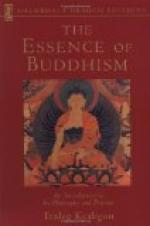Nor
[shall one] lay
Upon the brow of innocent
bound beasts
One hair’s weight of
that answer all must give
For all things done amiss
or wrongfully.
—Sir Edwin Arnold.
Doing no injury to any one,
Dwell in the world full of
love and kindness.
—Questions of King Milinda.
Ministering to the worthy,
doing harm to none,
Always ready to render reverence
to whom it is due.
Loving righteousness and righteous
conversation,
Ever willing to hear what
may profit another.
—Fo-pen-hing-tsih-king.
Scrupulously avoiding all
wicked actions;
Reverently performing all
virtuous ones;
Purifying his intention from
all selfish ends:
This is the doctrine of all
the Buddhas.
—Siau-chi-kwan.
Instruct yourself (more and more) in the highest
morality.—Nagarjuna’s “Friendly
Epistle.”
Cultivate compassion.—Visuddhi-Magga.
May my thoughts, now small and narrow, expand in the next existence, that I may understand the precepts ... thoroughly, and never break them or be guilty of trespasses.—Inscription in Temple of Nakhon Vat.
Religion he looks upon as his best ornament.—Fo-sho-hing-tsan-king.
The sinner is never beautiful.—Lalita Vistara.
Use no perfume but sweetness of thoughts.—Siamese Buddhist Maxim.
Wealth and beauty, scented flowers and ornaments like these, are not to be compared for grace with moral rectitude!—Fo-sho-hing-tsan-king.
He who ... cannot feel joy to see merit in others is stained with the darkness of sin.—Story of Pratiharyya.
Ask not of (a person’s) descent, but ask about
his
conduct—Sundarikabharadvaja-sutta.
The young man Vasettha said: “When one is virtuous and full of (good) works, in this way he becomes a Brahman.”—Vasettha-sutta.
Not by birth does one become low caste, not by birth a Brahman; by his deeds he becomes low caste, by his deeds he becomes a Brahman.—Vasala-sutta.
Whosoever strikes, or by words annoys, mother or father, brother or sister, ... let us know such as a “base-born.”—Vasala-sutta.
Causing destruction to living beings, killing and mutilating, ... stealing and speaking falsely, fraud and deception, ... these are (what defile a man).—Amagandha-sutta.
Whosoever ... harms living beings, ... and in whom there is no compassion for them, let us know such as a “base-born.”—Vasala-sutta.
In whom there is truth and righteousness, he is blessed, he is a Brahman.—Dhammapada.
Whoso hurts not (living) creatures, whether those that tremble or those that are strong, nor yet kills nor causes to be killed, him do I call a Brahman.—Vasettha-sutta.
Whoso is (entirely) divested of sin, as is the heaven of mire and the moon of dust, him do I call a Brahman.—Udanavarga.




